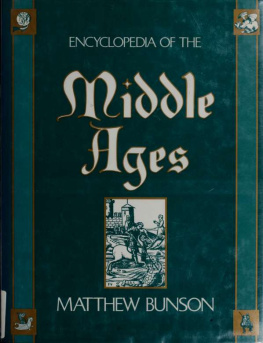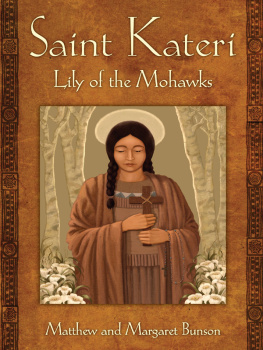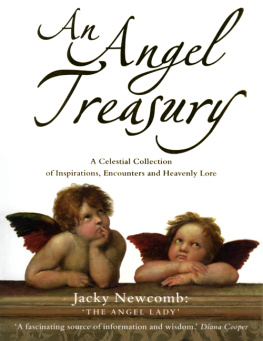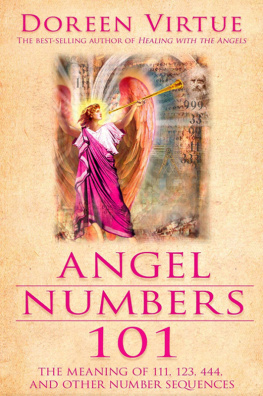Matthew Bunson - Angels A to Z: A Whos Who of the Heavenly Host
Here you can read online Matthew Bunson - Angels A to Z: A Whos Who of the Heavenly Host full text of the book (entire story) in english for free. Download pdf and epub, get meaning, cover and reviews about this ebook. year: 1996, publisher: Harmony, genre: Religion. Description of the work, (preface) as well as reviews are available. Best literature library LitArk.com created for fans of good reading and offers a wide selection of genres:
Romance novel
Science fiction
Adventure
Detective
Science
History
Home and family
Prose
Art
Politics
Computer
Non-fiction
Religion
Business
Children
Humor
Choose a favorite category and find really read worthwhile books. Enjoy immersion in the world of imagination, feel the emotions of the characters or learn something new for yourself, make an fascinating discovery.

- Book:Angels A to Z: A Whos Who of the Heavenly Host
- Author:
- Publisher:Harmony
- Genre:
- Year:1996
- Rating:5 / 5
- Favourites:Add to favourites
- Your mark:
- 100
- 1
- 2
- 3
- 4
- 5
Angels A to Z: A Whos Who of the Heavenly Host: summary, description and annotation
We offer to read an annotation, description, summary or preface (depends on what the author of the book "Angels A to Z: A Whos Who of the Heavenly Host" wrote himself). If you haven't found the necessary information about the book — write in the comments, we will try to find it.
Angels A to Z: A Whos Who of the Heavenly Host — read online for free the complete book (whole text) full work
Below is the text of the book, divided by pages. System saving the place of the last page read, allows you to conveniently read the book "Angels A to Z: A Whos Who of the Heavenly Host" online for free, without having to search again every time where you left off. Put a bookmark, and you can go to the page where you finished reading at any time.
Font size:
Interval:
Bookmark:

By the same author
Encyclopedia of the Roman Empire
The Vampire Encyclopedia
Encyclopedia Sherlockiana
The Angelic Doctor:
The Life and World of St. Thomas Aquinas
Our Sunday Visitors Encyclopedia
of Catholic History
The Pope Encyclopedia
Encyclopedia of the Middle Ages
Papal Wisdom:
Words of Hope and Inspiration
from Pope John Paul II
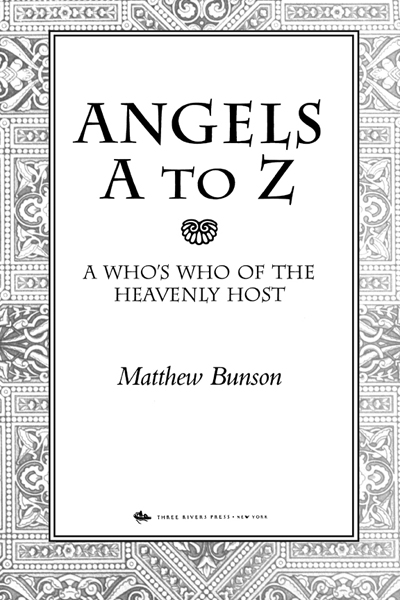

There are a number of individuals to whom a special debt of gratitude is owed for their help in the preparation of this volume. Among them are the staffs of several libraries, especially of Sahara West Library; Dakila Divina, Ariel Foxman, and Elke Villa of Crown Publishers, Inc.; and Ann Patty, editorial director of Crown, for her confidence. Most important, a very special thanks is owed to Jane Cavolina, my editor, for her trust, friendship, patience, and boundless enthusiasm, not to mention her many gifts as an editor.

A n angel who might, for whatever reason, find itself in even a modestly sized bookstore just about anywhere in the world would perhaps be both pleased and amused at the renaissance of the last years in the appreciation, honor, and even reverence given to his celestial brethren by mortals. The glorious residents of the heavenly halls are found today in books, cards, posters, stationery, paintings, videos, jewelry, and even candles. Angel merchandise decorates homes throughout the Orient, Africa, Europe, and the Americas, and people of all faiths agree that at no time has the spiritual strength and concern of the angels for all of humankind been more needed than on the troubled planet of our own era.
The foremost modern expression of mortal concern with the angelic, however, is in the area of books. An angel (or human, for that matter) can find works on the timeless wisdom of angelic love, self-help tips encouraging the reader to become more like the angels, and philosophical and spiritual speculation on all aspects of the angelic nature. Many of these works are today considered classics in the field of angel studies, such as those by Sophy Burnham, Malcolm Godwin, Gustav Davidson, and John Ronner, with new angel books appearing every year. The angel might thus rightly ask why another book has been published about his kind at a time when it seems that nothing further could possibly be contributed to the subject.
Angels A to Z is, in fact, needed and timely and does, it is hoped, have something more to contribute to what has proven to be a near endlessly interesting field of study. This reference work is intended to permit the reader to find in one easy-to-use, handy reference volume a compendium of angel lore, traditions, imaginings, and speculation, from millennia distant to our own age. Such information is spread out in a host of volumes and studies, many now largely unobtainable or exceedingly difficult to find. This book additionally aspires to provide what its subtitle declares: a Whos Who of the heavenly host.
In these pages the reader will find virtually every angel who has graced the earth with its wisdom or who has been said to have wandered the corridors of the heavenly mansions surrounding the throne of the Lord. A census compiled during the Middle Ages by a certain cardinal of Tusculum (a position of some importance in the medieval Church) estimated that there were some 399,920,004 angels in the cosmos. It is not the ambition of this book to provide coverage on all of these angelsas if their names were known anywaybut it does seek to offer complete, unusual, and interesting details, stories, legends, and traditions concerning angels from the beloved to the virtually unknown.
Beyond these angelic biographies, Angels A to Z offers, for the first time, coverage of every other aspect of angelology, including the incarnations of angels in art, literature, poetry, and film. Further, there are easy-to-consult sections on the main angelic attributes (their creation, gender, powers, etc.), angel wings, angels in the Bible, and the appearance of angels over the centuries. There are also the views on angels as expressed by the worlds major religions and cultures.
The current popularity of angels can be attributed to a number of reasons. There are those who derive enormous comfort from a simple certainty in the existence of angels. In this sense, angels stand as eternally vigilant guardians, helpers, and guides of humanity in times of darkest and most terrible need. Further, in a society in which organized religions are facing strife and challenge from within and without, angels are a powerful means of connecting with a spiritual existence without the need to adhere to a specific dogma or religious structure. Angel lore is today so much a part of the human consciousness less through one all-encompassing tradition or school of thought than through a mlange of peoples, creeds, and even literary and artistic customs. Angels are their own spiritual tradition, one that has undergone transformation and alteration by each generation discovering the heavenly host in all of its glory. Finally, and perhaps most important, throughout history one thought has proven powerfully constant and nearly universally accepted by Jewish writers, Christian saints, Muslim scholars, and followers of the New Age: The angel is one of the most beautiful expressions of the Concern of God for all of his creations, an idea beautifully expressed by Tobias Palmer in AnAngel in My House: The very presence of an angel is a communication. Even when an angel crosses our path in silence, God has said to us, I am here. I am present in your life.
Implicit in the existence of the angel is the inseparable reality of what it does. As St. Augustine wrote: Angels are spirits, but it is not because they are spirits that they are angels. They become angels when they are sent. For the name angel refers to their office, not their nature. You ask the name of this nature, it is spirit; you ask its office, it is that of an angel, which is a messenger. Be it as a minister of comfort and solace to the suffering or desperate, as the bringer of joyous tidings of an impending birth, or as a feared and fearsome warrior of destruction, the angel engages in each moment of angelic activity upon the earth as the fulfillment of a vital part of its purpose and an affirmation to the mortal that there is another realm beyond our own. The name angel is itself in fact derived from the idea of messenger, first in the Hebrew malakh and then in the Greek angelos, and its most famous appearances in history have come as part of its delivering of some divine message or declaration.
This does not mean that angels are exclusively messengers. As spirits created by God, they are also servants, caretakers, and worshipers. They serve the purposes and needs of the Lord by fulfilling any and all tasks assigned to them (the duties bestowed being ever equal to their specific natures as expressed by their affiliation with one of the highly varied angelic choirs). According to many sources in angel lore, only the angels, archangels, and principalities ever have anything to do with humanity, so it stands to reason that the other six choirs would have their own jobs and obligations. One of the most significant caretaking tasks is that of maintaining order and beauty in the cosmos. Beyond even these awesome responsibilities is the one of greatest joy to the angels: that of circling the divine throne to sing in endless praise of God. An undertaking that might sound rather dull or pointless to many, this sharing in the celebration of the Lord is said to be the highest honor sought by angels and the one carried out with greatest skill by the seraphim, cherubim, and thrones, the three higher choirs who are the finest reflection of the divine essence. The music of the angels, described as the music of the spheres, is beyond human comprehension.
Font size:
Interval:
Bookmark:
Similar books «Angels A to Z: A Whos Who of the Heavenly Host»
Look at similar books to Angels A to Z: A Whos Who of the Heavenly Host. We have selected literature similar in name and meaning in the hope of providing readers with more options to find new, interesting, not yet read works.
Discussion, reviews of the book Angels A to Z: A Whos Who of the Heavenly Host and just readers' own opinions. Leave your comments, write what you think about the work, its meaning or the main characters. Specify what exactly you liked and what you didn't like, and why you think so.

